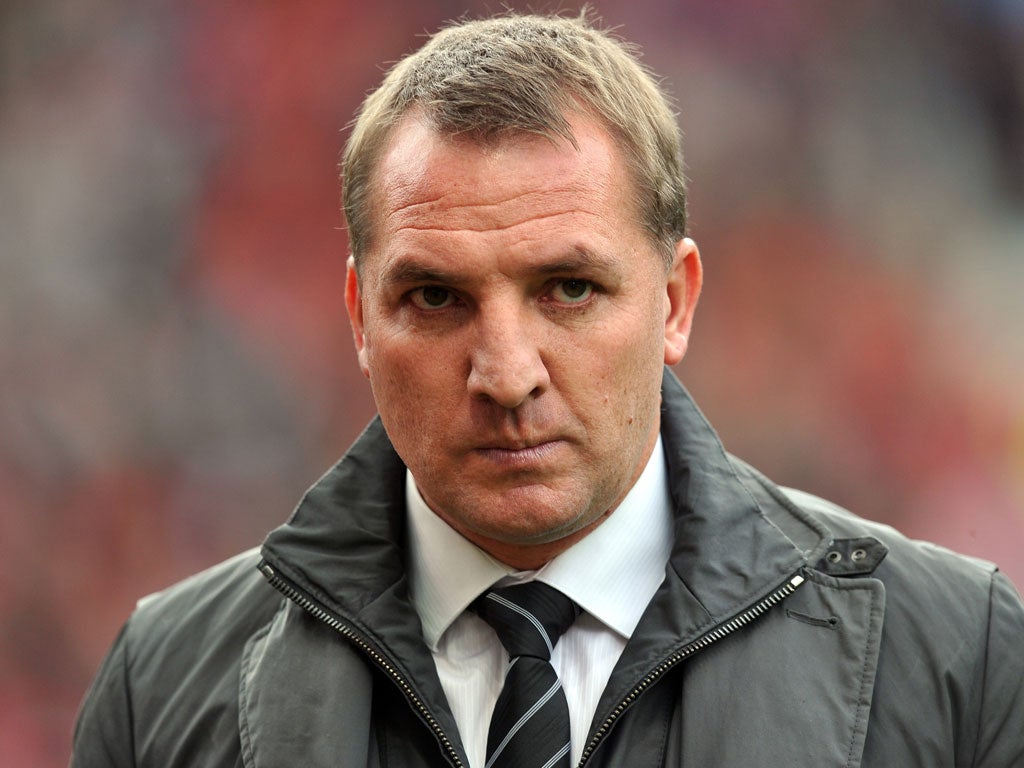New Liverpool manager Brendan Rodgers sets out vision for the club

Your support helps us to tell the story
From reproductive rights to climate change to Big Tech, The Independent is on the ground when the story is developing. Whether it's investigating the financials of Elon Musk's pro-Trump PAC or producing our latest documentary, 'The A Word', which shines a light on the American women fighting for reproductive rights, we know how important it is to parse out the facts from the messaging.
At such a critical moment in US history, we need reporters on the ground. Your donation allows us to keep sending journalists to speak to both sides of the story.
The Independent is trusted by Americans across the entire political spectrum. And unlike many other quality news outlets, we choose not to lock Americans out of our reporting and analysis with paywalls. We believe quality journalism should be available to everyone, paid for by those who can afford it.
Your support makes all the difference.New Liverpool manager Brendan Rodgers exerted his authority in his interview with the club's owners by insisting he would not work under a director of football
The 39-year-old has shown great strength of character throughout the whole recruitment process and turned down an initial approach a fortnight ago as he wanted to be considered first choice and not just one of many options.
When it was made clear to him by Fenway Sports Group (FSG) this week that he was their preferred option, he relented somewhat but he was not prepared to compromise on his ideals.
"It is one of the items I brought up when I was speaking to the club was that I wouldn't directly work with a director of football," said the Northern Irishman, as he was official presented to the media as successor to Kenny Dalglish at Anfield.
"I work best around a group of people and it is about a group of people.
"When you come to a big club you can't do it on your own. There is not one of us that is better than all of us.
"But what you need at a football club is you need an outstanding recruitment team, an outstanding medical and sports science team, player liaison team and these are all people who will come into the group and we will form a little technical board.
"There will be four or five people around that group who will decide the way forward."
FSG remain committed to a continental-style structure within the club, which will mean there will be a number of people appointed to cover the roles usually undertaken by a sporting director.
Rodgers, who said he was happy at Swansea, took a bold decision to turn down Liverpool's advances first time around but admitted he could not reject them when the call came again.
"I spoke to the chairman at Swansea and I always said if I left them it would be for a top club, but I would have to be the number one choice," he added.
"At that time maybe I was in a process so I was happy at Swansea, I was not crying to leave.
"When Liverpool came back in a second time to say I was the number one choice, I had to think seriously about it.
"I spoke with the Swansea chairman Huw Jenkins, who is a fantastic man, and he gave me permission to speak. Once I had found out I was the number one target from the important people at Liverpool it was quite an easy decision.
"I'm very proud, it's a club with wonderful tradition and I feel very blessed with the opportunity to manage the club."
When Rodgers' name was first mooted a significant proportion of fans seemed unimpressed and the former Chelsea coach, who also had spells as manager at Watford and Reading, knows he has to win over both supporters and players.
But he is supremely confident in his abilities to be a success.
"My pathway as a young coach has been different to most managers," he said.
"Even though I am young in age I have actually been coaching and working in football for 20 years.
"I had four and a half fantastic years at Chelsea and had experience of working with big players.
"I look at Kenny Dalglish. He was the manager [of Liverpool in 1985] at 34 and resigned at 39 and in that period he won three leagues and two FA Cups.
"I arrive here at 39, maybe young in age but experienced in the game.
"Footballers want to learn, to be educated and to improve and that is what I have done with all types of players, young and senior, throughout my career.
"It is about earning respect. I have always had to do that, it has been my life, I was never the big player so I never had that.
"I had to go down a different route and earn respect down the coaching route.
"It is about people. For me it doesn't matter where people are in terms of status, I always treat them as human beings - I never look at where they sit on an organisational chart.
"Whether you are a League Two player or a top Premier League player, it is about respect and I have carried that through from working with kids aged five to some of the biggest players in the world."
Join our commenting forum
Join thought-provoking conversations, follow other Independent readers and see their replies
Comments